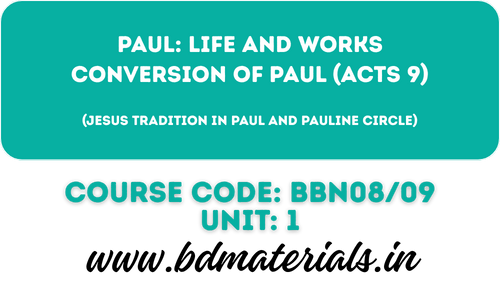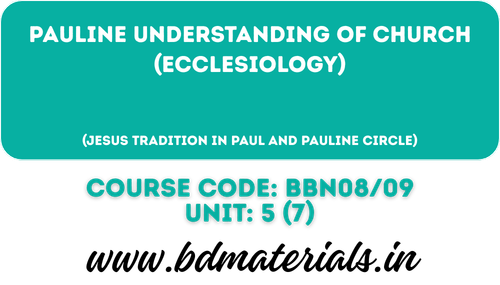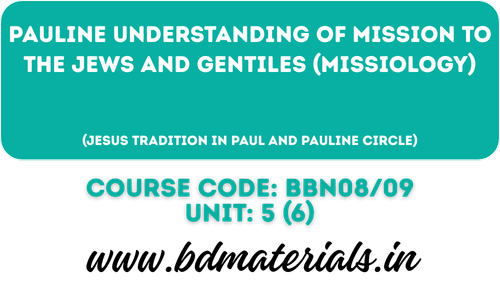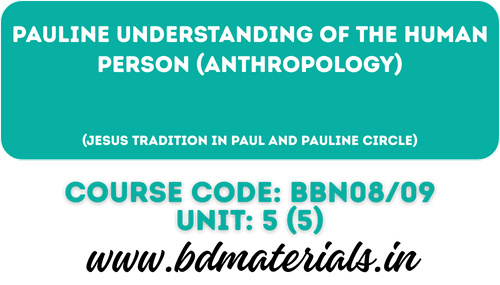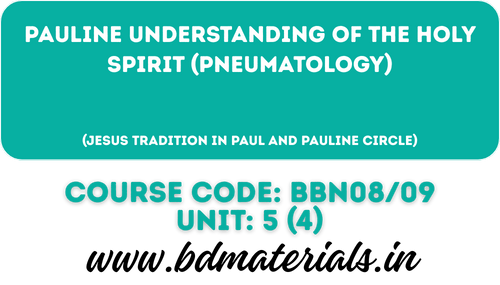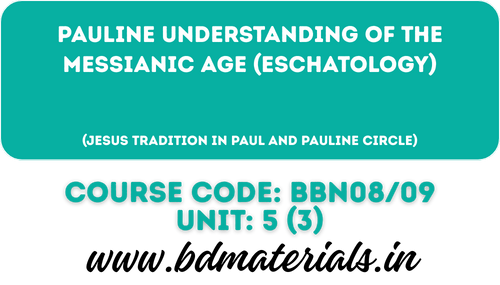Conversion of Paul (Acts 9)
Introduction
In this paper we are going to discuss about Conversion of Paul. The conversion of Paul, also known as the Damascus Road experience. Paul was a persecutor of early Christians he encounters with Jesus Christ on the road to Damascus. This event led to his conversion to Christianity and his subsequent missionary work to spread the Christian faith.
1. Paul of Tarsus, a Hebrew and a Pharisee
Paul was a Jew by race and religion (Rom 11:1); a native of Tarsus, the capital city in the Roman province of Cilicia (Acts 22:3). Paul wrote that he was a “Hebrew born of Hebrew,” a Pharisee (Phil 3:56) and one who advances Judaism beyond many of his peers. Paul’s family had a history of religious piety (2 Tim 1:3). Seemingly, the family lineage had been much attached to Pharisaic traditions and observances for generations (Phil 3:5-6). While he was still fairly young, he was sent to Jerusalem to receive his education at the school of Gameliel (Acts 22:3) one of the most noted rabbis in history. The Hillel school was noted for giving their students a balanced education, likely giving Paul broad exposure to classical literature, philosophy, and ethics.” He was from a devout Jewish family in the city of Tarsus – one of the largest trade centers on the Mediterranean coast. It had been in existence several hundred years prior to his birth. It was renowned for its university, one in which students could receive a superior education. During the time of Alexander, the great, Tarsus was the most influential city in Asia Minor.” He also wrote that he was “unmarried,” at least as early as his writing of 1 Corinthians 7:8, however some hold that he may have been married prior to that, due to certain textual analyses of his writings, and other similar rationale.1
Unlike any known child of his time, Paul was not consistently brought up in one culture. He was fully fledged Jew and from a Pharisaic background. He probably had his early education at home under the guidance of his father. He was very persistent in observing the Jewish law and upholding them which haunted him even till his middle age (cf. Phil 3:50). Very little is known about his youth. He went to Jerusalem to study. According to Acts 7:58, at the martyrdom of Stephen (ca. CE 36) the witnesses laid down their garments at the feet of a young man – according to Jewish tradition, one who is between 24 and 40 years of age – named Saul.2
2. Paul’s Name
It has been popularly assumed that Paul’s name was changed when he converted from Judaism to Christianity. His Jewish name was “Saul” in Hebrew Saul/Shauol ‘asked of God’ and in Greek Saulos, recalled the first King of Israel, incontestably the greatest man of the tribe of Benjamin. The book of Acts mentioned that Paul as a Roman citizen, he also bore the Latin name of “Paul” in biblical Greek Paulos and in Latin Paulus means small (cf. Acts 16:37; 33:25- 28). The Jews of that time have two names, one Hebrew, the other Latin or Greek. Thus, we know from his biography and from Acts that Paul could speak Hebrew and Aramaic. Modern scholarship suggests that Koine Greek was his first language from his diverse background.’! The former name was probably used in the Jewish circles and the latter in the Roman circles, for he possessed a Roman citizenship as well.3
Decaux mentions that the name “Paul” was changed after an interaction with the proconsul, Sergius Paulus, an intelligent man (Acts 13:7). The proconsul, wanted to hear Paul but it was Elymas, a magician who tried to distract him. Elymas became blind. When Proconsul saw what had happened, he believed his Lord (Acts 13:812). From that time his name was changed from Paulus to Paul. Perhaps, that led Saul to abandon his Jewish name. It can also be assumed that since there were many nations, people and languages that coexisted, it is highly possible that the substitution of one name for another was common practice under Roman standards. Another striking example is “Simon,” who was also called Cephas was later called Petrus.4
3. Conversion of Paul
According to Acts, on the road to Damascus Paul had a vision, saw a bright light, heard a voice calling him “Saul” in Aramaic (Acts 26:14) and on encountering Jesus there resulted his conversion. The Damascus experience alone cannot be just considered as starting point of his life. After the Damascus experience Paul became a transformed man and we cannot ignore the diverse culture which he possessed within himself for which this nature has become a tool for his transformation. The Jewish blood and the Jewish instructions from a Jewish teacher took him to zealously and become a source of destruction when his Jewishness could not tolerate the new movement Christianity. With the permission of the Roman government, he wanted to uproot it so that the supremacy of the Jewish religion could be established and the new religion of Christianity become as powerless. His initial reaction to the newly formed Christian movement was to zealously persecute its early followers and to violently attempt to destroy the movement. Paul’s dramatic conversion while on the road to Damascus was clearly a life- altering event for him, changing him from being one of the early movement’s most ardent persecutors to being one of its most fervent supporters.5
Paul’s conversion may be dated to CE 31-36 by his reference to it in one of his letters. It took place on the road to Damascus where he was reported having experienced a vision of the resurrected Jesus. The account says that “he fell to the earth, and heard a voice saying unto him, Saul, why do you persecute me?” he asked, “Who are you, Lord?” the reply came, “I am Jesus, whom you are persecuting” (Acts 9:4-5). Being momentarily blinded by the vision for three days and he was led into the city to meet Ananias. Although, Ananias had heard much about Saul and was justifiably scared, he too obeyed the Lord and took Saul in. Ananias laid hands on Saul and healed him of his temporary blindness. This life-changing experience and revelation convinced Paul that God indeed had chosen Jesus to be the promised Messiah. Luke, the author of Acts of the Apostles, likely learned of his conversion from Paul, from the church in Jerusalem, or from the church of Antioch.”6
Paul’s encounter with the risen Christ on the Damascus Road is often considered as the turning point in the life of Paul. This experience brought about a complete transformation in Paul’s outlook. This experience is also considered as the starting point of his Christian life. Whether or not, the Damascus experience was a real experience, the incident left an enormous impact on the life of Paul.7 Paul was not prepared for this incident which was happening to him all of a sudden. This encounter with the risen Lord brought about a dramatic transformation in the life of Paul, especially on three counts:
3.1. His understanding of God totally changed:
God of the Jews is now perceived as God of the Gentiles too. From a narrow, exclusive view of God to an inclusive God.
3.2. His understanding of the Messiah changed:
Paul viewed Jesus as a cursed one. It was anathema for him to think that the one crucified on the cross on the charge of blasphemy was the Messiah. He considered it blasphemous to say that Jesus was the Messiah. But through this encounter, he began to realize that Jesus, the crucified one, was indeed the Messiah of the world.8
3.3. His view of history changed:
The Jews divided world history into three ages: the period before the Law, the period of the Law, and the Messianic age. Paul and all other Jews thought that they were living in the second stage of world history, i.e., the period of the Law, looking forward to the Messiah’s coming. But this Damascus Road experience totally changed this understanding in Paul. From now, he considered that the world has entered into the third and final stage with the coming of Jesus. Rather than waiting for the coming of the Messiah, he began to understand that the Messiah had indeed come. What was thought to be a future event Paul begins to view as a past event.9
4. Damascus Experience as a Transformation
Paul had the experience at Damascus in AD. 34. While Paul was approaching Damascus, he suddenly experienced a vision of Christ. This experience had dramatic consequences, changing his entire life, altering his self-understanding, modifying his theological views, and eventually his goals in life. This experience turned him from a persecutor to a propagator of Christianity.
Like other disciples, though Paul was not a companion of Jesus in his earthly ministry, in Acts 9:15; 22:14; 26:16; and Romans 1:5 Paul clearly says that he was commissioned by Christ himself to proclaim the gospel among the gentiles. The Damascus experience of Paul had changed the proud and persecuting Saul into loving, helpful, Apostle Paul.10
There is a good deal of question whether Paul’s Damascus experience should be considered as the point of his transformation or should be considered on the basis of his ministry to the Gentiles. If, it is to be considered his transformation than Acts accounts are true, bring the nature of his transformation. The stages of transformation are mentioned in this account as follows.
4.1. Appearance of Christ:
Whether it was in flash of light or the real appearance of Christ, the accounts of Acts affirms that Christ appeared to Paul, which was the beginning of his transformation. It is to be noted that neither of the accounts declare that Christ appeared physically before Paul. It is also seen that Jesus appeared before Paul after his resurrection is not to be considered as the confirmation of his apostleship but the affirmation of his transformation.11
4.2. Light and Voice:
Light and Voice can be considered as the appearance of Jesus Christ. But, the account of Acts says something more than this. Light and voice are the means of not only accepting Christ but also setting forth the life of Paul. But a question arises why the figure of Ananias did not come into the life of Paul or in the Acts accounts as the light and voice event ended with Ananias only. On the other hand, Paul also neglected the role of Ananias in his life. He never confessed the significance of Ananias in his life. Light and Voice would not play any impact on Paul’s life had there been no Ananias. Ananias only summarizes and implemented this light and voice event.12
Conclusion
From this paper we have learned about the conversion of Paul. Paul’s encounter with Christ on the Damascus Road represented a turning point in his life, altering his perspective and beginning his Christian path.
Bibliography
- Jamir, Menjiwapong. Understanding the New Testament. Kolkata: SCEPTRE, 2021.
- Jose, Jojan. Life and Thoughts of Paul: A Christological Study of Paul and His Corpus in the Greco-Roman, Jewish, Christian Background. Delhi: Christian World Imprints, 2021.
- SP, Tunchapbo. Jesus Tradition in Paul and Pauline Circle. Delhi: Christian World Imprints, 2022.
Footnotes
- Tunchapbo SP, Jesus Tradition in Paul and Pauline Circle (Delhi: Christian World Imprints, 2022), 25-26.
- SP, Jesus Tradition in Paul and Pauline Circle, 26.
- SP, Jesus Tradition in Paul and Pauline Circle, 5.
- SP, Jesus Tradition in Paul and Pauline Circle, 5
- SP, Jesus Tradition in Paul and Pauline Circle, 5-6.
- SP, Jesus Tradition in Paul and Pauline Circle, 6.
- SP, Jesus Tradition in Paul and Pauline Circle, 28.
- Menjiwapong Jamir, Understanding the New Testament (Kolkata: SCEPTRE, 2021), 213.
- Jamir, Understanding the New Testament, 213-214.
- Jojan Jose, Life and Thoughts of Paul: A Christological Study of Paul and His Corpus in the Greco-Roman, Jewish, Christian Background (Delhi: Christian World Imprints, 2021), 83-84.
- SP, Jesus Tradition in Paul and Pauline Circle, 29.
- SP, Jesus Tradition in Paul and Pauline Circle, 29.
Friendly Note
Greetings in the name of our Lord Jesus Christ! We are deeply thankful for your visit to BD Materials. It is our mission and joy to serve Bible students, pastors, and believers with high-quality theological resources that strengthen faith and understanding of God’s Word.
At BD Materials, you’ll find study notes, articles, question papers, and valuable academic content designed to support your biblical and theological education. We are dedicated to helping you grow in knowledge, ministry, and devotion to Christ.
We also invite you to explore our partner sites: Telugu Gospel Lyrics, featuring inspiring gospel song lyrics in Telugu, and Theological Library, a hub for Christian book summaries and devotionals.
Your encouragement means a lot to us! We invite you to share your study materials, articles, or insights with our community. Thank you for being part of this mission—may God bless your studies and ministry abundantly!
